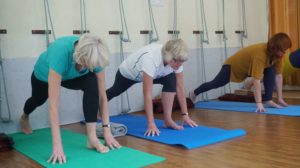Can Seniors Improve Their Bone Density?

The senior population in the United States is increasing, thanks in large part to modern advances in technology. However, as seniors reach the age of 65, they may start to experience a decrease in muscle mass and bone mass. The loss of bone mass is known as osteopenia or osteoporosis. Osteoporosis is the more serious progression of osteopenia.
An estimated 99 million adults over the age of 50 had severely decreased bone density mass in the United States in 2010. 43 million of those seniors had osteopenia. Experts estimate that by the year 2030, the number of seniors with osteoporosis will increase to 71 million.
When left untreated, this loss of bone density can increase the risk for falls and fractures. Bouncing back from a fracture as a senior is not easy and can result in limited mobility and reduced independence. Even worse, it is estimated that up to 20 percent of women who suffer a hip fracture will die within one year.
Improve Your Bone Density in 5 Easy Steps
While the loss of bone density is common, it doesn’t have to be. Fortunately, studies show that seniors can improve their bone density and reduce the risk of serious fractures or medical complications as they age.
Step 1: Examine Your Diet
Increasing the intake of calcium and vitamin D is crucial to promoting musculoskeletal health. The National Osteoporosis Foundation recommends adults over the age of 50 take 1,200 mg of calcium and 800-1000 IU of vitamin D daily. You can take supplements, or you can try and incorporate high calcium foods into your diet and get adequate sunlight. Talk to your doctor about testing your blood levels to see if you are low in calcium and vitamin D.
Step 2: Exercise
Weight training and walking are two of the most beneficial exercises for older adults. These exercises can increase bone density significantly. Weight-bearing exercises and weight training are important to improving muscle mass, reducing weight, and improving bone density. In addition, programs like Tai Chi can reduce the risk of falling by improving balance and coordination.
Step 3: Reduce Alcohol and Tobacco
Alcohol and smoking both reduce bone density and overall health. More than 2 drinks a day for women and 3 drinks a day for men increase the risk of falling. Smokers have a reduced ability to heal fractures. To improve your musculoskeletal health, the National Osteoporosis Foundation recommends reducing your alcohol consumption and stopping smoking altogether.
Step 4: Avoid Caffeinated Beverages
Studies have shown that highly caffeinated beverages stop the body from properly absorbing calcium. The FDA recommends 400 mg of caffeine per day – around 800 mg or more per day is considered too high. Even if you take calcium supplements, if you are consuming high quantities of caffeine, your body might not be able to absorb the calcium it needs. This can lead to serious osteoporosis and other health issues.
Step 5: Get a Bone Density Scan
While a bone density scan won’t necessarily improve your bone density, it will let you know when your bone density starts to decline. If a bone density scan shows the beginning of osteoporosis, you can take the necessary steps and ward off serious issues. This diagnostic tool is invaluable when protecting seniors from the serious complications associated with the loss of bone mass.
Let ImageCare Radiology Perform Your Bone Density Scan Today
At ImageCare Radiology, we offer dual-energy x-ray absorptiometry or DEXA scan. This is the most advanced and reliable method to measure bone density. A bone density DEXA scan is painless and easy to perform. It provides our radiologists with a clear image of the bone mass, so you can locate and identify bone density issues before they become advanced problems.
Early detection is key to improving bone density loss and living longer, healthier, and more vibrant lives. If you are over the age of 65, health experts recommend a health assessment to see if you are a candidate for a DEXA scan.
If your doctor has requested imaging services for you, contact us today at 973-871-3333 to schedule an appointment or complete our convenient online appointment request form.